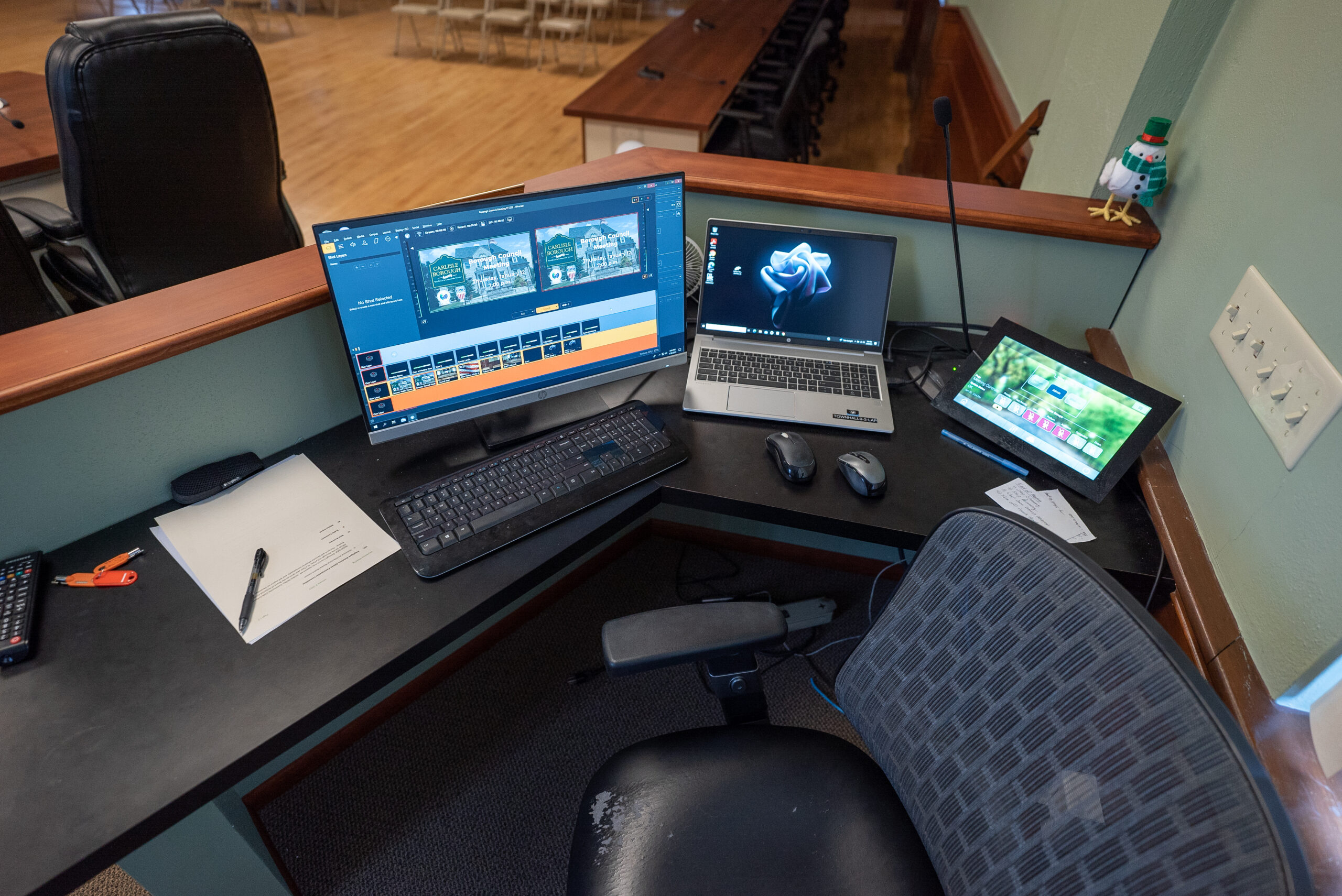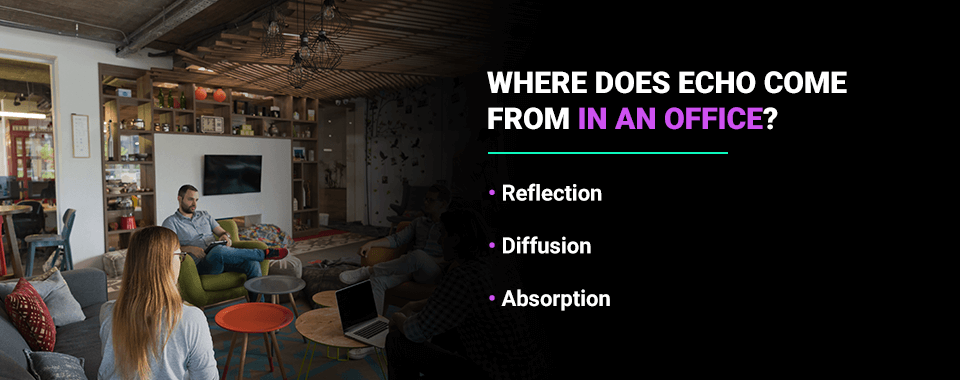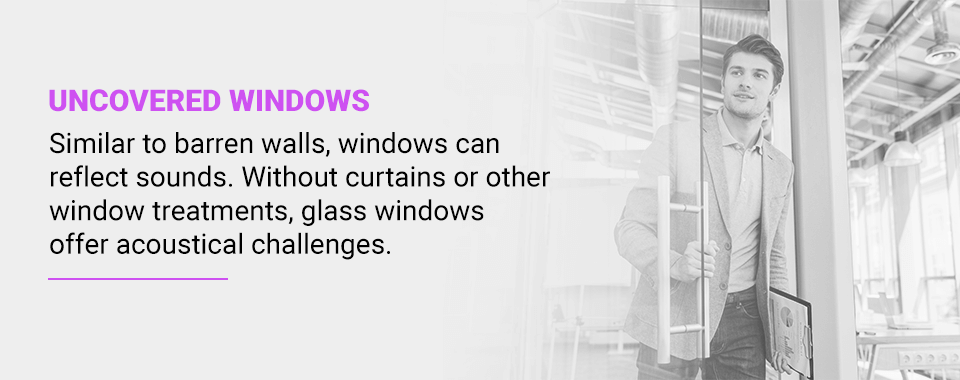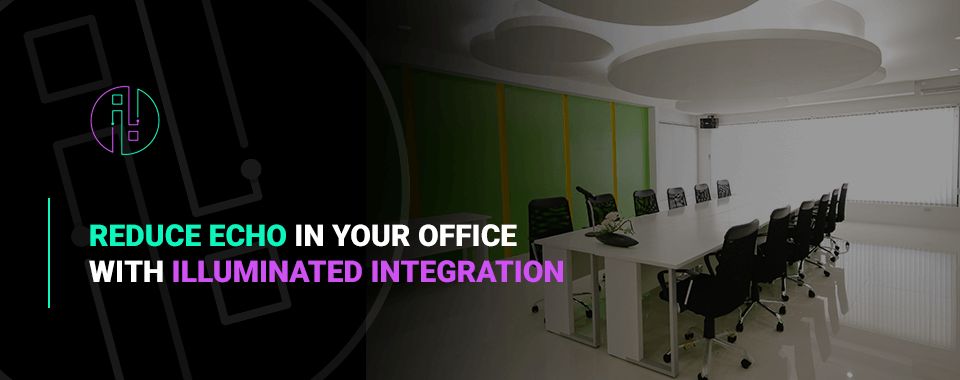

In any workspace, efficiency and communication are extremely valuable. These indicate healthy collaboration and hard work. But, what if the design of your office is interfering with your team’s performance? For many offices, especially those with an open floor plan, the buzz of people chatting and moving around causes disruptive noise that can travel through the entire room.
Reducing unnecessary noise in the office has major benefits for your team and their productivity. Learning how to reduce echo in an office and implementing strategies to cut back current echo level gives your staff the best work environment possible, allowing them to enjoy private conversations and fully concentrate on the task at hand.

Sound travels until it hits a surface that obstructs it. When a sound wave hits a surface, the following three things can happen:
Whether your office space is big or small, you could be dealing with echo if your setup does not include pieces that diffuse or absorb sound waves. Anytime you have hard, smooth surfaces, the noise can bounce off them and reflect back into the room. The following design choices can cause echoing effects in the office.
Tall ceilings give a room a beautiful look and open feel, but they can also heighten echos. The empty space above the office allows sound waves to bounce back and forth freely. These sounds are especially troublesome if you have a lot of people working on separate tasks in the same room. Voices and other sounds like scooting chairs or setting down supplies can carry throughout the office, amplifying as they bounce off the ceiling.
If you have minimal furnishings in your office, you may be making echo worse for yourself and your staff. Without anything soft to break up traveling sounds, they can reflect off everything from the ceiling to the floor and amplify throughout the space. If your office is spacious and your furniture takes up only a small portion of the area, this can contribute to sound waves traveling back and forth. Additionally, if you have hard plastic or metal furniture pieces, sound is more likely to bounce off these pieces than softer, upholstered furniture.
Empty walls are a major culprit of echo. Even in small spaces, voices can reflect back and forth, creating an environment where it’s challenging to concentrate. If you have framed photos hanging on your walls, the echoing can also worsen as the glass is hard and reflective, just like the wall.

Similar to barren walls, windows can reflect sounds. Without curtains or other window treatments, glass windows offer acoustical challenges. Most sound waves that hit the glass will reflect back into the room. In addition to reflecting noise, glass can also vibrate from resonance, meaning windows can buzz from sounds vibrating against them. This hum can create more sound problems for your office.
Most office spaces have workstations complete with desks or tables. If these work areas occupy a lot of space and are relatively empty, they can add to the room’s echo. If you organize your office as a collaborative space, the tables may have little on them. This creates clear surfaces that are perfect for sounds to bounce off of and back into the room, leading to an echo effect.
Beyond the empty walls and tabletops, other hard surfaces can contribute to an office’s echo. These surfaces include anything from whiteboards to metal filing cabinets. Rigid materials do not absorb much sound, and office furniture is generally not soft or cushioned. Instead, office pieces are usually made of hard materials that do little to stop sound.
Around 30% of employees in offices with open floor plans are dissatisfied with the noise they deal with at work. In spaces where noises carry and sounds echo off the walls, it can be incredibly challenging to focus on what you have right in front of you.
Office spaces without proper acoustics can make it difficult for employees to work together or engage with their duties. Creating an atmosphere without bothersome sound issues comes with many advantages for your team. With peace of mind and calm surroundings, people are more likely to produce excellent quality work than in a noisy and distracting environment.
The following are some of the many benefits of cutting back on echo and improving acoustics in the office.
When you reduce echo in a conference room or office, you give employees more privacy.
When a room has a lot of echoes, that indicates sounds are traveling and more people are probably hearing what is being said. However, not every conversation between co-workers is everyone else’s business. By adding elements to quiet the room, your team can enjoy more privacy.
Improved privacy gives co-workers an environment for honest, collaborative conversations that lead to some of their best work.
Around 58% of high-performing employees say a quiet and calm space is key to completing their daily tasks efficiently. When sound travels less throughout a space, workers can enjoy a more peaceful ambiance perfect for zoning in on their work and getting things done quickly.
Allow your team to prove how productive they can be with an office free of distracting echoes and carrying voices. By giving your employees a quiet and calm area to engage with their work, you give them the tools to be more effective.
When your team works in an environment where it is easy to concentrate, they can do their jobs better and more quickly. If you workers can focus all of their attention on their daily tasks, they are more likely to deliver high-quality work, and they may be able to improve your bottom line.
Having a serene space is vital for critical thinking and problem-solving. If you want your team to pay closer attention to their work, consider reducing echo in the office.
By introducing elements into your office space that make it calmer, you can create a more comfortable ambiance for everyone. Having a peaceful workspace allows individuals to relax and be less reactive to all the sensory information around them.
When you cut back on echo, your employees mightthis makes everyone feel more confident that they can and will hear any important announcements shared with the office.
Plus, the materials that reduce echo are soft and cushioned. Having these in your office can enhance the overall feeling of comfort.

Most people would agree that working in a calm and echo-free workspace is better than listening to every sound in the office bouncing off the walls. By giving your employees a place to concentrate in peace, you show them you respect their hard work and effort. When a team feels valued, they are more likely to be happy at their job.
When your employees are happy, everyone benefits! They may even be more willing to go above and beyond for their employer.
Loud work environments can be a safety hazard. If something happens in the office building, everyone must be able to hear what is going on so they can respond safely.
In an emergency, everyone should hear leadership personnel as they handle the issue or share the next steps. These messages can get lost in an overly noisy workspace, and the office can become chaotic. Keep your team safe by taking measures to reduce sound and unnecessary echo.
For most people, work stress is nothing new. People are often anxious about work, from needing to complete a project on time to wanting to impress the boss. Performing work tasks in a noisy environment is less than ideal for someone trying to do well. Your team could benefit from reducing echo and sharing a quieter space.
Working is less stressful when you have calm conditions to operate in. Being proactive about noise in the office can help reduce distraction and may influence greater focus.
Reducing the echo in the room makes it easier to hear and engage with co-workers. Collaboration is one of the most valuable aspects of working in an office.
Beyond needing to hear one another, office employees may participate in virtual meetings and calls. If your workers do not have designated conference rooms or alternate places to take these meetings, they might be partaking in the call from a shared space where other voices and noises can interfere. By adding elements to prevent echo, workers can enjoy better sound quality in their video meetings and when they collaborate in person.
If your employees need to use their creativity to perform their job’s functions, they probably prefer working in peace and quiet. Hearing extraneous chatter and other sounds echoing off the walls and floors is distracting and can reduce creativity.
Whether your team is problem-solving or designing, they need to put their ingenuity to work. Think about the difference between solving a riddle in silence versus trying to figure it out at a chaotic party. Quiet environments allow you to hear your thoughts and focus on the task at hand.
To reduce echo in an office, you must introduce elements into the space that will diffuse and absorb traveling sound waves. By hiring professional design consultants, you can find and install effective sound solutions that lessen distracting noise. Here are a few ways to create a quieter and more comfortable office environment with less echo and more privacy.

Cutting back on echo in your office can promote productivity and employee happiness. By adding new elements into your work space’s design, you can enjoy a quieter environment that is easier to work in.
Our team at Illuminated Integrations consists of design and integration professionals with experience in acoustics for all kinds of markets, from places of worship and schools to museums and performance venues. We create a customized plan to cater to your office space and goals. Our experts install everything and provide ongoing support for the best turnkey experience.
Interested in starting your AVL project? Contact Illuminated Integration today!